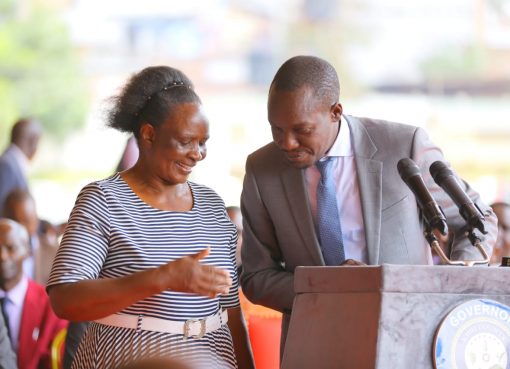The Industrial Crops Research Centre based at Kenya Agriculture and Livestock Research Organization (KALRO)-Mwea, has received advanced research equipment and machinery from the International Rice Research Institute (IRRI), which will enhance mechanization, improve data collection accuracy, and optimize research efficiency, particularly in rice cultivation.
The Sh35 million equipment handover event at KALRO Center in Mwea was led by IRRI Country Representative Dr. Abdelbagi Ismail and graced by, KALRO Director General Dr. Eliud Kireger alongside Deputy Director General, Crops Dr. Felister Makini.
Dr. Kireger expressed gratitude, emphasizing how the resources would drive innovation and strengthen agricultural research for key crops like rice, maize, and wheat.
He added that Kenya has a huge deficit and imports a lot of rice noting that with mechanization and use of recommended seedlings, the country would bridge the gap.
“As you are aware, we import about 80 % of the rice that we consume. We produce slightly less than 20%. Therefore, you can see the deficit is very huge. To be able to increase the production in the areas that are cultivated, we must mechanize for efficiency and use quality certified seed,” said Dr. Kireger.
On his part, Dr. Abdelbagi Ismail said that the donation of machinery will boost rice production in the country, calling on farmers to adopt new farming technology.
“All the countries that we went to, like India, used to be like Kenya, importing a lot of rice. But when they modernized their system, developed good varieties and mechanized the whole system, they were able to be now the largest exporter in the world. Any country can do that,” he explained.
He noted that Mwea is the most advanced scheme right now in the country and in the region in terms of mechanization but they were hoping to extend to all the irrigation schemes, and mechanize rain-fed areas that will be a big step for rice production.
“You can easily triple productivity and probably cut the cost by half if you really mechanize the operations. The farmers can grow very large areas, so mechanization is really the starting point for development. It’s very important to move from all hand-held equipment to mechanized equipment that can do what maybe 100 farmers can do in one day,” he said.
Some of the equipment donated are planters, land levellers and accessories, mobile thresher driers, digital devices and tractors, which will be used by farmers in the area.
By Mutai Kipngetich





